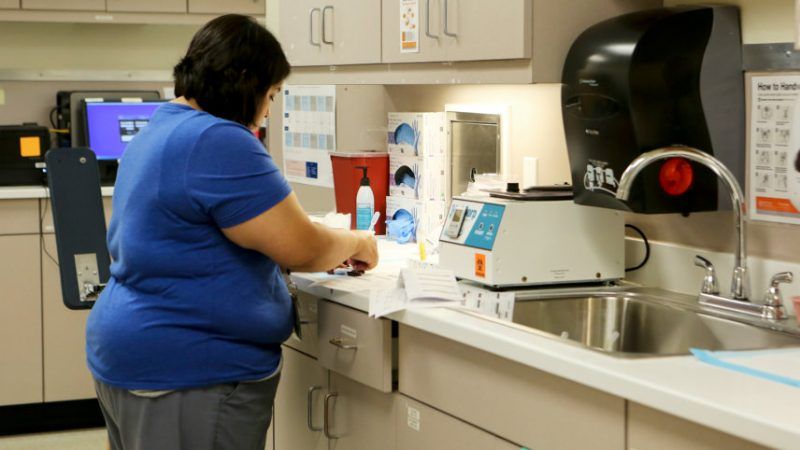Trump Purportedly Planning Grant Ban for Groups That Don't Disavow Abortion: Reason Roundup
Plus: newsstand "porn passes" offer privacy in the U.K., and why "extreme vetting" of immigrants has failed


No grants for groups that "support" abortion. The U.S. already prevents federal funding from covering abortion services. Now the Trump administration may cut off any group that so much as talks about abortion.
On Friday, Donald Trump is expected to announce plans to resurrect an old rule prohibiting federal grant money from going to any group that even discusses abortion as an option for pregnant women. The rule would also prohibit funds from going to health clinics or organizations that share a space or affiliation with an abortion provider, according to what White House officials have told the AP and other news outlets.
The rule was first drafted under President Ronald Reagan, but it was never implemented and was withdrawn by President Bill Clinton. Then as now, doctors and health groups noted that abortion is a legal medical procedure and argued that making family planning grants contingent on pretending it's not an option represents a serious interference in doctor-patient relationships. "I cannot imagine a scenario in which public health groups would allow this effort to go unchallenged," Jessica Marcella of the National Family Planning & Reproductive Health Association told the AP.
Some libertarians will inevitably argue in favor of the move on the grounds that anything that cuts federal spending is good. But that rests on a faulty premise, since the change doesn't signal one cent of a reduction in federal funds overall. It would simply shift who is eligible to receive the money and how free their speech can be.
To the extent that this means more unintended pregnancies and more undesired births, we could actually see a net increase in federal expenditures on health care and family planning. There's no way this move is really a fiscally conservative one. For most pushing the change, it's about religious doctrine or morality.
And for Trump? Winning would seem to be one prominent motive. "In addition to the policy implications," notes NBC, "the decision is a monumental signal by President Donald Trump to anti-abortion activists entering a mid-term election cycle in which Republicans are worried that they will lose seats in Congress—and perhaps control of one or both chambers—because of a lack of enthusiasm within the GOP base."
In this case, it doesn't matter if the policy has a chance of succeeding, just that Trump is perceived as being on the same page as his anti-abortion supporters.
There's still a possibility that the Trump administration will hold out on them, however. Contra most other outlets, NBC is reporting that the White House "will stop short of giving abortion foes one provision they sought: a gag rule prohibiting recipients from discussing abortion with pregnant women."
According to NBC's source, the rule change will only apply to groups "that perform abortions, support the procedures or receive referrals about them." But that language is way too ambiguous to offer much reassurance that this isn't creating a sort of viewpoint-based determination on whether abortion can be discussed in these settings.
U.K. porn scheme grows ever more complicated. In the wake of the U.K.'s new rule requiring age verification for all online porn viewers, the government is proposing a workaround that would let audiences opt out of handing their personal data to porn sites. Instead, they can pick up a "porn pass" at their local newsstand or corner shop (presumably without the shopkeeper storing a record of the customers' IDs after checking their ages, or else the whole rigmarole would be pretty pointless).
"Trench coats are coming back!" quips Tim Cushing at Techdirt. "Somewhat of an ironic turn of events, given how much government effort was expended trying to limit the amount of public porn consumption by shutting down theaters and heavily regulating distribution of pornography." Now, "instead of heading to porn shops in shady areas of town, porn consumers will be headed to newspaper kiosks to publicly announce their desire to consume porn in the privacy of their own homes." Or so the U.K. government hopes.
QUICK HITS
- The "Extreme Vetting Initiative"—Trump's proposed system of predicting which potential immigrants would be troulbe—has failed, "dealing a reality check to the goal of using artificial intelligence to predict human behavior."
- There are rumors of an Anthony Scaramucci and Michael Avenatti show in the works.
- Provisional data from the National Center for Health Statistics show that the U.S. birth rate is down two percent overall in 2017, and down for all groups except women ages 40 to 44 (where it's up two percent).
- HBO won a copyright battle with a graffiti artist who argued that fleeting glimpse of street art constituted copyright infringement.
- The U.S. Food and Drug Administration finally approved a new, non-opioid-based pill to help with opioid withdrawal symptoms.
- Prominent Democrats are opposing a Jared Kushner–backed prison reform bill because it doesn't include sentencing reform.
- Trump has turned "there's probably no doubt that [the FBI] had at least one confidential informant in the [Trump] campaign" to this:
"Apparently the DOJ put a Spy in the Trump Campaign. This has never been done before and by any means necessary, they are out to frame Donald Trump for crimes he didn't commit." David Asman @LouDobbs @GreggJarrett Really bad stuff!
— Donald J. Trump (@realDonaldTrump) May 18, 2018


Show Comments (220)